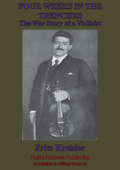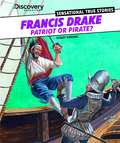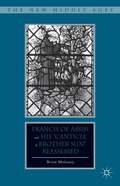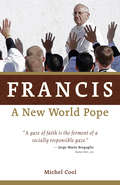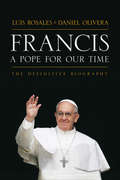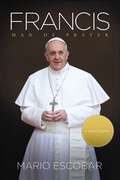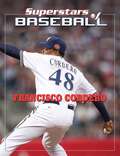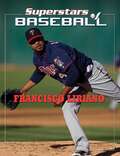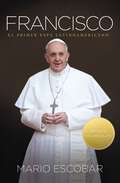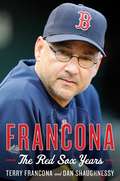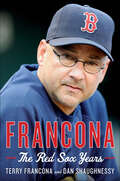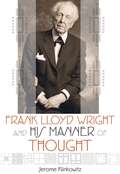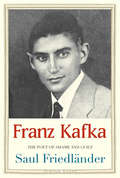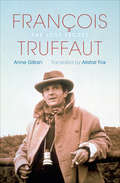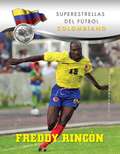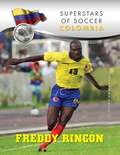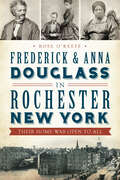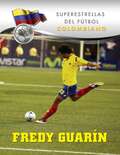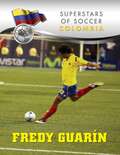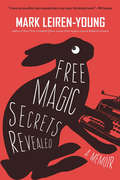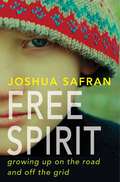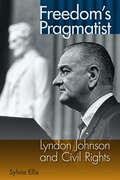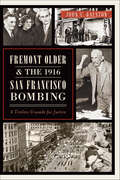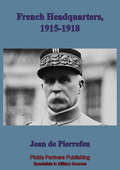- Table View
- List View
Four Weeks In The Trenches; The War Story Of A Violinist [Illustrated Edition]
by Fritz KreislerFriedrich "Fritz" Kreisler was an Austrian-American violinist and composer of great renown, often regarded as one of the finest violinists of all time. He was, however, for a brief time an officer of the Austrian army during the First World War; but unlike the voluminous literature of Gallipoli and the Western Front in English, his memoirs of the fighting on the Eastern Front provide a rare insight seldom seen. Although clearly not a full record of the time that he spent in the Austrian service, before being honourably discharged after being wounded, the events that he chronicled are of considerable detail, artistic merit and lasting interest.
Francis Drake: Patriot or Pirate? (Discovery Education: Sensational True Stories)
by Robert SheehanFrancis Drake was a man some considered a hero, while others thought he was nothing more than a criminal. Readers will decide for themselves in this fact-filled volume. Easy-to-follow text and colorful illustrations will keep any young readers interest.
Francis Of Assisi And His "canticle Of Brother Sun" Reassessed
by Brian MoloneyBringing the skills of a literary historian to the subject, Brian Moloney considers the genesis of Saint Francis of Assisi's Canticle of Brother Sun to show how it works as a carefully composed work of art. The study examines the saint's life and times, the structure of the poem, the features of its style, and the range of its possible meanings.
Francis, a New World Pope: A New World Pope
by Michel CoolAfter Pope Benedict XVI's historic resignation of the papal office in February 2013, the College of Cardinals elected Jorge Mario Bergoglio, Archbishop of Buenos Aires -- now Pope Francis -- as the new leader of the world's estimated 1.2 billion Roman Catholics.But who is this new Pope -- really?In Francis, a New World Pope, Michel Cool surveys Pope Francis's journey to the papacy, his convictions, his personality, his writings, and the challenges he faces in his new office -- governance of the church, new evangelization in secularized societies, and poverty, among many others.Peppered throughout with anecdotes that demonstrate the humanity of Pope Francis -- and his sensitivity to those who are most distant from the Church -- this book paints a vibrant portrait of the man who has chosen for his motto miserando atque eligendo: "lowly but chosen."
Francis: A Pope for Our Time
by Luis Rosales Daniel OliveraFrancis: A Pope for Our Time, The Definitive Biography incisively chronicles Pope Francis' ancestry, youth, call to faith, humble beginnings with the Society of Jesus, and rise through Argentina's ecclesiastical ranks, all the way to the Vatican. The book emphasizes His Holiness' Jesuit background of humility, poverty, and service that stands to reform the Vatican's long history of lavish excess. The book illustrates Pope Francis' pastoral commitment to society's most underprivileged and disenfranchised.
Francis: Man of Prayer
by Mario EscobarFirst Jesuit. First Latin American. And a new pope who chose as his first act a simple request: please pray for me.The recent resignation of Pope Benedict XVI took the world by surprise and for good reason. More than 600 years had passed since a pope last left his post.Jorge Mario Bergoglio, now Pope Francis, is a man of prayer, a man of action, and a humble man who has always promoted others over himself. In fact, it was Bergoglio who bowed out of the running in the papal election of 2005 to facilitate the rise of Benedict XVI.However, the new pope faces a Catholic Church in crisis--a church that has lost the media pull of John Paul II and is still hounded by pedophile scandals and the filtration of documents from former papal administrations. His first year may not be an easy one, but neither this man nor the church itself has ever shied away from the challenges thrust upon them.Pope Francis is austere and simple but has vast theological training. He is a man of his time but one who also travels by subway and bus just like any other citizen. Tirelessly fighting poverty and marginalization, he is a beacon of hope for the poor, persecuted sectors of the church. Has a Catholic spring finally arrived after a very long winter?Francis is the complete biography of a humble man who has suddenly become one of the most powerful and influential men on the planet.
Francisco Cordero (Superstars of Baseball)
by Tania RodriguezFrancisco Cordero--or "Coco", as his fans and teammates know him--is a top-notch pitcher. He strikes out batters with his fastballs and sliders. He's racked up a lot of saves over the years as a closing pitcher for teams like the Rangers, the Brewers, and the Reds. Although when Cordero was a child, his family struggled with poverty, Cordero now does his part to help others who are struggling. He's a Big League player with character!
Francisco Liriano (Superstars of Baseball)
by Tania RodriguezFrancisco Liriano is a powerful Major League pitcher. Fans have watched him overcome injury after injury. He always comes back! His amazing stats and strong pitching arm have earned him awards, as well as millions of dollars. Ever since he was a young baseball player in the Dominican Republic, Liriano has been one of a kind. Find out more about his road to the Big Leagues--and discover what it takes to be a baseball superstar!
Francisco: El primer papa latinoamericano
by Mario EscobarEl Primer Papa Latinoamericano. Un hombre que eligió como su primer acto una simple petición: por favor oren por mí.Francisco es la biografía completa de un hombre humilde que de la noche a la mañana se ha convertido en uno de los hombres más influyentes del planeta.La reciente dimisión del Papa Benedicto XVI tomó al mundo por sorpresa y por buenas razones. Más de 600 años han pasado desde que un Papa renunció a su cargo.Jorge Mario Bergoglio, ahora Papa Francisco, es un hombre de oración, un hombre de acción y un hombre humilde que siempre ha promovido a otros sobre sí mismo. El fue quien en 2005 renunció al papado, para facilitar el ascenso de Benedicto XVI.Sin embargo, el nuevo Papa enfrenta a una iglesia católica en crisis --una iglesia que ha perdido la atracción de los medios de comunicación de Juan Pablo II y es acosada por los escándalos de pedofilia. Su primer año puede no ser fácil, pero ni este hombre ni la Iglesia han eludido los retos que se les han impuesto.El Papa Francisco es un hombre sencillo pero con una amplia formación teológica. Es un hombre de su tiempo, pero uno que también viaja en metro y autobús al igual que cualquier otro ciudadano. ¿Ha llegado por fin la primavera después de este invierno tan largo?El primer papa latinoamericano es una completa biografía de un hombre humilde que repentinamente se ha convertido en uno de los hombres más poderosos e influyentes del planeta.
Francona: The Red Sox Years
by Dan Shaughnessy Terry FranconaFrom 2004 to 2011, Terry Francona managed the Boston Red Sox, perhaps the most scrutinized team in all of sports. During that time, every home game was a sellout. Every play, call, word, gesture--on the field and off--was analyzed by thousands. And every decision was either genius, or disastrous. In those eight years, the Red Sox were transformed from a cursed franchise to one of the most successful and profitable in baseball history--only to fall back to last place as soon as Francona was gone. Now, in Francona: The Red Sox Years, the decorated manager opens up for the first time about his tenure in Boston, unspooling the narrative of how this world-class organization reached such incredible highs and dipped to equally incredible lows. But through it all, there was always baseball, that beautiful game of which Francona never lost sight. As no book has ever quite done before, Francona escorts readers into the rarefied world of a twenty-first-century clubhouse, revealing the mercurial dynamic of the national pastime from the inside out. From his unique vantage point, Francona chronicles an epic era, from 2004, his first year as the Sox skipper, when they won their first championship in 86 years, through another win in 2007, to the controversial September collapse just four years later. He recounts the tightrope walk of managing unpredictable personalities such as Pedro Martinez and Manny Ramirez and working with Theo Epstein, the general managing phenom, and his statistics-driven executives. It was a job that meant balancing their voluminous data with the emotions of a 25-man roster. It was a job that also meant trying to meet the expectations of three owners with often wildly differing opinions. Along the way, readers are treated to never-before-told stories about their favorite players, moments, losses, and wins. Ultimately, when for the Red Sox it became less about winning and more about making money, Francona contends they lost their way. But it was an unforgettable, endlessly entertaining, and instructive time in baseball history, one that is documented and celebrated in Francona, a book that examines like no other the art of managing in today's game.
Francona: The Red Sox Years
by Dan Shaughnessy Terry FranconaTHE NEW YORK TIMES BESTSELLER. “Eloquent and dazzling,” the story of the legendary baseball manager’s tenure with the Boston Red Sox (Philadelphia Daily News).When Terry Francona took over as manager of the Boston Red Sox in 2004, the storied franchise hadn’t won a World Series championship in eighty-six years. Led by Francona, the team won two over the course of four years. During the full eight years of Francona’s tenure, the Red Sox were transformed from “cursed” into one of the most successful and profitable teams in baseball history—only to fall back to last place as soon as Francona was gone.Francona: The Red SoxYears lets readers in on the inner workings of the Red Sox clubhouse like no book has ever done before. From the highs of the World Series to the lows of the final months of the 2011 season—the most epic collapse of a team in baseball history—this book features the never-before-told stories about Sox fans’ favorite players, moments, wins, and losses.“A scorched-earth memoir . . . [that] touches fleetingly on steroid use, sabermetrics, and Michael Jordan’s stint in the minor leagues . . . but saves its heaviest artillery for the owners . . . [and] Theo Epstein backs him up.” —The New York Times Book Review“It’s not often that baseball aficionados and gossip gluttons can plunk down on a shared portion of outfield grass with the same book for an afternoon of readerly delight, but Francona can bridge those kinds of differences.” —The Boston Globe
Frank Lloyd Wright and His Manner of Thought
by Jerome KlinkowitzAn iconic figure in American culture, Frank Lloyd Wright is famous throughout the world. Although his achievements in architecture are stunning, it is his importance in cultural history, Jerome Klinkowitz contends, that makes Wright the object of such avid and continuing interest. Designing more than just buildings, Wright offered a concept for living that still influences how people conduct their lives today. Wright's innovations in architecture have been widely studied, but this is the most comprehensive and sustained treatment of his thought. Klinkowitz presents a critical biography driven by the architect's own work and intellectual growth, focusing on the evolution of Wright's thinking and writings from his first public addresses in 1894 to his last essay in 1959. Did Wright reject all of Victorian thinking about the home, or do his attentions to a minister's sermon on "the house beautiful" deserve closer attention? Was Wright echoing the Transcendentalism of Ralph Waldo Emerson, or was he more in step with the philosophy of William James? Did he reject the Arts and Crafts movement, or repurpose its beliefs and practices for new times? And, what can be said of his deep dissatisfaction with architectural concepts of his own era, the dominant modernism that became the International Style? Even the strongest advocates of Frank Lloyd Wright have been puzzled by his objections to so much that characterized the twentieth century, from ideas for building to styles of living. In "Frank Lloyd Wright and ""His Manner of Thought," Klinkowitz, a widely published authority on twentieth-century literature, thought, and culture, examines the full extent of Wright's books, essays, and lectures to show how he emerged from the nineteenth century to anticipate the twenty-first. "
Frank Nasworthy's Wonder Wheels (Fountas & Pinnell LLI Red #Level P)
by Gary MillerFrank Nasworthy's Wonder Wheels Author: Gary Miller
Franz Kafka: The Poet of Shame and Guilt
by Saul FriedlanderFranz Kafka was the poet of his own disorder. Throughout his life he struggled with a pervasive sense of shame and guilt that left traces in his daily existenceâ "in his many letters, in his extensive diaries, and especially in his fiction. This stimulating book investigates some of the sources of Kafkaâ TMs personal anguish and its complex reflections in his imaginary world.In his query, Saul Friedländer probes major aspects of Kafkaâ TMs life (family, Judaism, love and sex, writing, illness, and despair) that until now have been skewed by posthumous censorship. Contrary to Kafkaâ TMs dying request that all his papers be burned, Max Brod, Kafkaâ TMs closest friend and literary executor, edited and published the authorâ TMs novels and other works soon after his death in 1924. Friedländer shows that, when reinserted in Kafkaâ TMs letters and diaries, deleted segments lift the mask of â œsainthoodâ ? frequently attached to the writer and thus restore previously hidden aspects of his individuality.
François Truffaut: The Lost Secret
by Anne Gillain&“Truffaut fans will love this English translation of Gillain&’s work drawing on the psychology and cinematography of the acclaimed filmmaker.&” —Booklist For François Truffaut, the lost secret of cinematic art is in the ability to generate emotion and reveal repressed fantasies through cinematic representation. Available in English for the first time, Anne Gillain&’s François Truffaut: The Lost Secret is considered by many to be the best book on the interpretation of Truffaut&’s films. Taking a psycho-biographical approach, Gillain shows how Truffaut&’s creative impulse was anchored in his personal experience of a traumatic childhood that left him lonely and emotionally deprived. In a series of brilliant, nuanced readings of each of his films, she demonstrates how involuntary memories arising from Truffaut&’s childhood not only furnish a succession of motifs that are repeated from film to film, but also govern every aspect of his mise en scène and cinematic technique. &“Brilliant . . . A delicious reexamination . . . that will make us want to sit down and take in all of Truffaut&’s wonderful filmography at once.&” —PopMatters
Freddy Rincón (Superstars of Soccer SPANISH)
by Rodolfo Iguarán CastilloDurante más de una década, desde 1990 a 2001, Freddy Rincón fue un sólido jugador de la Selección Nacional de Colombia. En 84 partidos con los Cafeteros, incluyendo tres torneos de la Copa del Mundo, el centrocampista marcó 17 goles. Durante su carrera, Rincón también jugó para una variedad de clubes en Colombia, Europa y Brasil. Se retiró en 2004.
Freddy Rincón (Superstars of Soccer)
by Rodolfo Iguarán CastilloDurante más de una década, desde 1990 a 2001, Freddy Rincón fue un sólido jugador de la Selección Nacional de Colombia. En 84 partidos con los Cafeteros, incluyendo tres torneos de la Copa del Mundo, el centrocampista marcó 17 goles. Durante su carrera, Rincón también jugó para una variedad de clubes en Colombia, Europa y Brasil. Se retiró en 2004.
Frederick & Anna Douglass in Rochester New York: Their Home Was Open to All
by Rose O'KeefeThe story of the upstate New York home where the orator and former slave lived with family, houseguests, and fugitives on the Underground Railroad. Despite living through one of our nation&’s most bitter and terrifying times, Frederick Douglass and his wife, Anna, raised five children in a loving home with flower, fruit, and vegetable gardens in Rochester, New York for twenty-five years beginning in 1848. While Frederick traveled widely, fighting for the freedom and rights of his brethren, Anna cared for their home, family, and extended circle. Their house was open to fugitives on the Underground Railroad, visiting abolitionists, and houseguests who stayed for weeks, months, and years at a time. In this book, local history expert Rose O&’Keefe weaves together the story of the Douglasses&’ experience in Rochester and the indelible mark they left on the Flower City. Includes illustrations
Fredy Guarín (Superstars of Soccer SPANISH)
by Silvia MeaveFredy Guarín anotó el mejor gol de la temporada de fútbol europeo 2010-2011. De este modo el mediocampista nacido en Puerto Boyacá se confirmó como uno de los grandes ídolos del fútbol en Colombia. Fredy, que fue medallista de oro al lado de sus compañeros de la selección colombiana en los XX Juegos Centroamericanos y del Caribe en 2006, es hoy una esperanza para la selección nacional de su país en las próximas eliminatorias hacia la Copa Mundial de Fútbol Brasil 2014. Empezó 2012 como jugador del equipo italiano Inter de Milán por un período de seis meses, que podría extenderse en un contrato millonario definitivo. Actualmente Guarín es uno de los jugadores latinoamericanos más cotizados a nivel mundial.
Fredy Guarín (Superstars of Soccer)
by Silvia MeaveFredy Guarín anotó el mejor gol de la temporada de fútbol europeo 2010-2011. De este modo el mediocampista nacido en Puerto Boyacá se confirmó como uno de los grandes ídolos del fútbol en Colombia. Fredy, que fue medallista de oro al lado de sus compañeros de la selección colombiana en los XX Juegos Centroamericanos y del Caribe en 2006, es hoy una esperanza para la selección nacional de su país en las próximas eliminatorias hacia la Copa Mundial de Fútbol Brasil 2014. Empezó 2012 como jugador del equipo italiano Inter de Milán por un período de seis meses, que podría extenderse en un contrato millonario definitivo. Actualmente Guarín es uno de los jugadores latinoamericanos más cotizados a nivel mundial.
Free Magic Secrets Revealed
by Mark Leiren-YoungLike all great adventures, this one starts with someone trying to get a girl. After all, King Meneleaus didn't go to Troy for the baklava.Playwright, journalist, comedian and bestselling author Mark Leiren-Young recalls his teenage escapades in this hilarious memoir and coming-of-age story. A geeky bully-magnet, Mark was seventeen and wanted to be a playwright, but even more than that, he wanted to impress Sarah, the girl he'd pined for since elementary school. It's 1980 and, thanks to Doug Henning, magic is hip, so Mark hooks up with Randy, a stoner magician, and Kyle, an ambitious young actor, to chase fame-and the women of their dreams. Seeing a chance at having all of their desires come true, they risk everything to create a show they know will be like Star Wars on stage. But is getting a date worth having your head cut off?
Free Spirit: Growing Up On the Road and Off the Grid
by Joshua SafranAn Unforgettable Journey Through an Unconventional ChildhoodWhen Joshua Safran was four years old, his mother--determined to protect him from the threats of nuclear war and Ronald Reagan--took to the open road with her young son, leaving the San Francisco countercultural scene behind. Together they embarked on a journey to find a utopia they could call home. InFree Spirit, Safran tells the harrowing, yet wryly funny story of his childhood chasing this perfect life off the grid--and how they survived the imperfect one they found instead.Encountering a cast of strange and humorous characters along the way, Joshua spends his early years living in a series of makeshift homes, including shacks, teepees, buses, and a lean-to on a stump. His colorful youth darkens, however, when his mother marries an alcoholic and abusive guerrilla/poet.Throughout it all, Joshua yearns for a "normal" life, but when he finally reenters society through school, he finds "America" a difficult and confusing place. Years spent living in the wilderness and discussing Marxism have not prepared him for the Darwinian world of teenagers, and he finds himself bullied and beaten by classmates who don't share his mother's belief about reveling in one's differences.Eventually, Joshua finds the strength to fight back against his tormentors, both in school and at home, and helps his mother find peace. But Free Spirit is more than just a coming-of-age story. It is also a journey of the spirit, as he reconnects with his Jewish roots; a tale of overcoming adversity; and a captivating read about a childhood unlike any other.
Freedom's Pragmatist: Lyndon Johnson and Civil Rights
by Sylvia EllisHistory has labeled Lyndon B. Johnson "Lincoln's successor." But how did a southern president representing a predominately conservative state, with connections to some of the nation's leading segregationists, come to play such an influential role in civil rights history? In Freedom's Pragmatist, Sylvia Ellis tracks Johnson's personal and political civil rights journey, from his childhood and early adulthood in Texas to his lengthy career in Congress and the Senate to his time as vice president and president.Once in the White House, and pressured constantly by grassroots civil rights protests, Johnson made a major contribution to the black freedom struggle through his effective use of executive power. He provided much-needed moral leadership on racial equality; secured the passage of landmark civil rights acts that ended legal segregation and ensured voting rights for blacks; pushed for affirmative action; introduced antipoverty, education, and health programs that benefited all; and made important and symbolic appointments of African Americans to key political positions.Freedom's Pragmatist argues that place, historical context, and personal ambition are the keys to understanding Johnson on civil rights. And Johnson is key to understanding the history of civil rights in the United States. Ellis emphasizes Johnson's complex love-hate relationship with the South, his innate compassion for the disadvantaged and dispossessed, and his political instincts and skills that allowed him to know when and how to implement racial change in a divided nation.
Fremont Older and the 1916 San Francisco Bombing: A Tireless Crusade for Justice
by John C. RalstonOn Saturday, July 22, 1916, as "Preparedness Day" parade units assembled south of San Francisco's Market Street, a terrorist bomb exploded, killing ten people and wounding forty. San Francisco was outraged. Instead of searching for the perpetrators, however, the district attorney used the bombing as an excuse to arrest, try and convict two obscure labor figures without evidence. Author John C. Ralston chronicles the dramatic events following the initial tragedy as newspaper editor Fremont Older discovers the case is based on blatant perjury and exposes the secondary crime to the public. What became known as the "American Dreyfus Case" led to an international outcry, finally resulting in one defendant's pardon and the other's parole--but only after both men had been imprisoned for twenty-three years..
French Head Quarters 1915-1918
by Jean De PierrefeuA Journalist in charge of the daily military communiques at French headquarters gives his view of the events as he saw them under the changing French war leadership.Although information on the early years of Jean de Pierrefeu is sketchy, even in his native France, however it is known that he started his journalistic career in 1905 and by 1908 was working for the political weekly L'Opinion. He career continued, leaning toward nationalist sympathies, until he was mobilized as part of the French Army reserves. Swiftly wounded and invalided out of the line, he began working for the Grand Quartier-Général in 1915 as part of the staff dealing with the evening new bulletins. He would have to use all of his journalistic skill to be as economical with the brutal truth of the losses and reverses at the front suffered by the French during 1915-1918. During this period he met with all of the senior officers of the French High Command of whom he had varied opinions of their skill; it was during this time that he began to become disillusioned with the French leadership. After the First World War ended Pierrefeu sharpened his criticisms and published his damning criticism of the French Army as "French Headquarters, 1915-1918". He is frequently critical of his superiors and the elegant lifestyle at headquarters and holds back nothing in his vivid depiction of army life."The writer of this amusing book had the task of drawing up each evening the communiqué of French General Headquarters. What he writes is military gossip rather than military history, but he gives an interesting insight into the life of the headquarters under Joffre, Nivelle, and Pétain."-- p. 67 Cyril Falls. War Books, London, 1930.
